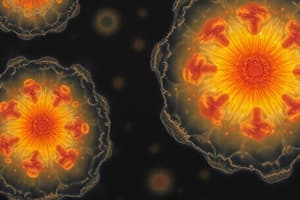Podcast
Questions and Answers
What is the basic unit that all living things are composed of?
What is the basic unit that all living things are composed of?
cell
Who invented one of the first prototypes of the microscope?
Who invented one of the first prototypes of the microscope?
Zacharias Janssen
In what year did Robert Hooke report the first clear drawings of plant cells?
In what year did Robert Hooke report the first clear drawings of plant cells?
1665
What term did Robert Hooke coin when he observed cells?
What term did Robert Hooke coin when he observed cells?
Who discovered blood cells and sperm cells in 1673?
Who discovered blood cells and sperm cells in 1673?
What did Lorenz Oken propose in 1805 regarding organisms?
What did Lorenz Oken propose in 1805 regarding organisms?
Who discovered the nucleus in plant cells in 1833?
Who discovered the nucleus in plant cells in 1833?
What substance did Felix Dujardin recognize within the cell?
What substance did Felix Dujardin recognize within the cell?
What did Matthias Jakob Schleiden and Theodore Schwann conclude about cells?
What did Matthias Jakob Schleiden and Theodore Schwann conclude about cells?
Cells arise only by division of a previously existing _____
Cells arise only by division of a previously existing _____
Which of the following is NOT one of the principles of modern cell theory?
Which of the following is NOT one of the principles of modern cell theory?
Flashcards are hidden until you start studying
Study Notes
Overview of Cells
- Cells are fundamental membrane-bound units forming all living organisms.
- They provide structural integrity, facilitate nutrient absorption, energy conversion, and execute specialized functions.
- Cells house hereditary material and possess the capability to replicate.
Historical Milestones in Cell Discovery
-
1600s: Zacharias Janssen, a Dutch lens maker, created one of the first microscope prototypes.
-
1665: Robert Hooke famously drew plant cells observed in cork, coining the term "cell" reminiscent of monk occupied spaces.
-
1673: Antonie van Leeuwenhoek discovered blood cells, sperm cells, and "animalcules" (later identified as bacteria and protozoans) using his powerful microscope.
Development of Cell Theory
-
1805: Lorenz Oken proposed that all organisms originate from and consist of cells, marking an early statement toward modern cell theory.
-
1833: Robert Brown identified the nucleus as a constant feature in plant cells, further observed in animal cells.
-
1835: Felix Dujardin recognized the living substance within cells, originally named sarcode, which was later termed protoplasm by Jan Evangelista Purkinje.
-
1838-1839: Matthias Jakob Schleiden and Theodore Schwann established that cells are elementary components of both plants and animals, identifying unicellular and multicellular organisms.
-
1858: Rudolf Virchow asserted that cells are the basic structural unit of life and arise from preexisting cells.
Modern Cell Theory Principles
- All organisms are constructed from one or more cells.
- Cells serve as the essential unit of organization in all living beings.
- New cells only arise from the division of existing cells.
Studying That Suits You
Use AI to generate personalized quizzes and flashcards to suit your learning preferences.




